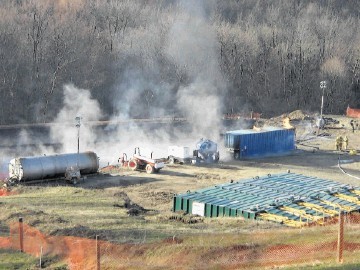
Labour is attempting to tighten the rules on fracking to prevent shale gas exploration in protected areas such as national parks and improve environmental safeguards.
Shadow energy minister Tom Greatrex has tabled 11 amendments to the Infrastructure Bill to close what Labour describes as “key loopholes” in the environmental regulations governing extraction of the unconventional gas resource.
The amendments include introducing a presumption against development in protected areas such as national parks and areas of outstanding natural beauty (AONBs) and putting an obligation on operators to monitor and report “fugitive” emissions from sites.
The changes would also see the devolution of licensing for shale gas to Scotland, ensure there was properly independent inspections of the integrity of the wells, and make baseline assessments of methane in groundwater to prevent pollution.
Local authorities would be able to consider the cumulative impacts of multiple shale gas developments in their area under the amendments and companies would have to disclose the contents of the fluid used for fracking for each well.
The Government is pushing for the development of a shale gas industry, claiming it would create jobs and growth, reduce energy prices and cut the country’s reliance on gas imports.
However, opponents have raised fears that the process causes earthquakes, can pollute water supplies, lead to inappropriate development in the countryside and damage house prices.
Mr Greatrex said: “Shale gas extraction cannot go ahead unless we have a system of robust regulation and comprehensive inspection.
“Despite clear flaws in the existing framework, David Cameron’s government have repeatedly side-lined genuine and legitimate environmental concern and seem prepared to accept shale gas at any cost.
“While eight out of 10 homes still rely on gas for heating, shale gas may have a role to play in displacing some of the gas we currently import and improving our energy security – it is not about increasing how much gas we use, but where we get it from.
“But that potential benefit cannot come at the expense of robust environmental protections or our climate change commitments.”
Recommended for you
